DC Edit | Realistic plan to fight Maoists

Union home minister Amit Shah’s announcements that the government will not deploy the Army in the combat against Maoists and is pursuing a twin strategy of establishment of rule of law and development of backward areas instead indeed reflect a cohesive and realistic approach to end this violent stream of political activity in the country.
Maoists thrive in the most backward areas in the country and feed on the apathy of the governments towards addressing the very basic needs of the population. Mindless exploitation of the natural resources in total disregard of the lives and livelihood of the indigenous populations has been another reason that gets Maoists what support they get in the tribal areas. The thrust on the development demands of the people of Naxal-affected areas will, therefore, undermine the very foundation on which Maoism thrives and will weaken the movement in due course.
Deploying the Army, which is trained to fight an enemy, against citizens cannot be the best option. This has been proven time and again in Kashmir and in Northeast India. It is one of the fundamental principles of democracy to address political issues through the political process. The Army should either be fighting the enemy on the border or take part in disaster relief operations. The government’s decision not to stretch it thus is hence welcome.
The pace of democracy and its processes are painfully slow and may not always match the demands of the population. However, sustainable development in human history has been slow; and the government must ensure that extremist elements are not allowed to cash in on it. Deepening democracy and setting up mechanisms for equitable distribution of the fruits of growth are, however, the only way to go. Let the Army stay in the barracks.

